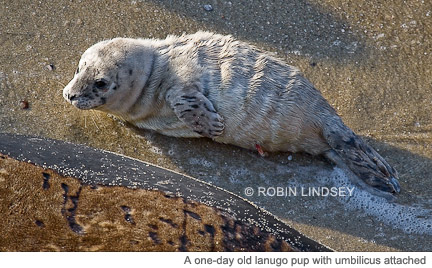lanugo
Seal pupping season in full swing - stay away from seals and pups!
Jul/10/16 07:17 PM
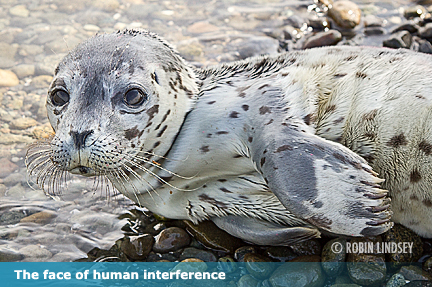
Nursing pups, however, are dependent on their moms for survival for the first 4-6 weeks of their lives. In the waters of Central and South Puget Sound, pups are born from late June through the first week of September (view a map of pupping season in WA). Always stay far back from any pup you come across.
A harbor seal mom, shy and wary of humans, will abandon her pup if people and dogs are around. Use common sense and help protect wildlife from harassment and abandonment.
YOUR PRESENCE CAN CAUSE STRESS AND ABANDONMENT
As you head for the beach, know that seashore revelry is definitely no party for harbor seal pups, who are seeking to rest onshore. Humans and dogs cause pups to be abandoned every year. A harbor seal mom often will not return for her nursing pup if there is a disturbance or perceived threat. It goes without saying that July fireworks cause animals to be abandoned every year.
If you find a spot for your picnic on a beach near a harbor seal, please move your picnic to another beach. There are reports of people with blankets and coolers surrounding a lone seal pup - finally calling the stranding network wondering why the mother did not return.
Weaned seal pups need space to rest undisturbed as well. A pup that is scared into the water wastes precious calories - and this can truly be the difference between life and death.
This is a reminder that when you venture out to the beach, whether by trail or boat, please respect animals’ space and need for quiet. Stay back!
SEALS ARE PROTECTED BY LAW FROM HARASSMENT
Please stay a minimum of 100 yards away from resting seals. Like all marine mammals, they are protected from harassment by the Marine Mammal Protection Act and Washington State law RCW 77.15.130 (a criminal misdemeanor, mandatory court appearance, punishable with up to 90 days in jail and up to $1000 fine).
STAY FAR AWAY FROM HARBOR SEAL HAUL-OUTS
Harbor seals gather in large groups this time of year at haul-outs (called rookeries during pupping season), where moms and pups find safety in numbers. Pups pay a terrible price for human disturbance. The seal pup shown above was found in 2012, starving on Cutts Island, along with two other emaciated pups and several dead ones. All had been abandoned by their mothers because boaters disrupted the seal colony on this small South Puget Sound island near Gig Harbor. Durning boating season, thousands of boats can be moored offshore at Cutts, disrupting this historic harbor seal haul-out.
A day of boating fun for people can be a death sentence for seal pups. When you are boating or kayaking, please stay far away from resting harbor seals.
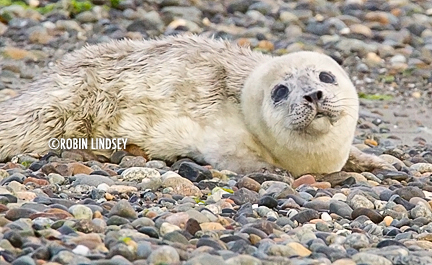
Please contact the stranding network to respond to a lanugo pup.
RESPECT NATURE AND STAY BACK
Leave seal pups be - don’t touch, move or feed them. If you are concerned about a pup, call the NOAA hotline @ 1-866-767-6114. To learn more about harbor seals and pups, visit Seal Sitters website here.
Pupping season gets off to an early - and rough - start
Jun/14/15 04:29 PM
For the second June in a row, Seal Sitters has responded to a premature pup on West Seattle’s shore. At 5pm on Wednesday, the hotline fielded a call about a tiny pup resting near the Alki Lighthouse on Coast Guard property.
First Responder Lynn was on the scene within minutes. Through her binoculars, she could see that the pup was covered almost entirely in fluffy, white lanugo fur, normally shed inside the womb as a pup matures to full-term before birth. A fleshy umbilicus was visible. Lynn’s heart sank. She knew it was going to be a tremendous challenge to keep the beach quiet in hopes mom might return to nurse him.
It was urgent to keep the public - and dogs - as far away as possible and volunteers out of sight as well. Lynn immediately called the volunteer scheduler for the day. Denise checked the online calendar and began ringing volunteers who had entered time for the day. Wearing blue i.d. vests, they were stationed alongside barricades strung with yellow tape, far down the beach south and north of the lighthouse. Waterfront homeowners were alerted that a newborn pup was on the beach and asked to please keep a low profile - they were happy do anything to help. It was truly a life and death situation for the pup.
Neighbors graciously allowed First Responders Lynn and David access through their property so we could periodically get quick health assessment photos, crouched on their deck (Seal Sitters owes them tremendous thanks). Photos revealed that the pup was 80% lanugo (about 2 weeks premature) and, based on the condition of the umbilicus, was possibly a few days old. The pup was nicknamed Wynken, from the beloved 1889 children’s poem, Wynken, Blynken and Nod.
As darkness fell, volunteers left their posts for home, but returned to duty again early Thursday morning. Wynken was still on shore and the low tide would enable public access around the point. First Responders noticed the pup seemed thinner, but would occasionally stretch and stir. Volunteers tried to keep up hope that mom was still in the area. Wynken returned briefly to the water at high tide and then was back on shore. Once again, until almost 10 pm, volunteers patiently stood vigil at far ends of the beach for a pup they had yet to see.
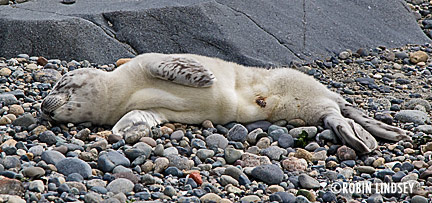 Early Friday morning, Wynken was discovered sleeping in the rocks on the opposite side of the lighthouse and was markedly thinner (photo shown). Photos were reviewed by WDFW’s marine mammal biologist. Based on body weight it was obvious that there was no attending female. Most likely, Wynken had not eaten since he was born 3-5 days earlier.
Early Friday morning, Wynken was discovered sleeping in the rocks on the opposite side of the lighthouse and was markedly thinner (photo shown). Photos were reviewed by WDFW’s marine mammal biologist. Based on body weight it was obvious that there was no attending female. Most likely, Wynken had not eaten since he was born 3-5 days earlier.
The difficult decision was made to remove the pup from the beach for humane euthanasia before he suffered. Lanugo seal pups are not candidates for rehabilitation in the Northwest, based on their health challenges and high mortality in nature. Therefore, if abandoned, euthanasia is the only option. Since Seal Sitters MMSN has a binding contract with NOAA giving us the authority to respond to marine mammals, we are obligated to abide by NOAA policy and guidelines, as are area rehabilitation facilities.
Read here for NOAA policy on lanugo pups.
On Friday afternoon, First Responder Robin drove Wynken to be sedated and then euthanized.
After the ensuing necropsy, we can now say for sure that mom was never present for this pup, since the intestines and stomach were entirely empty. Why the pup was abandoned is purely speculation. 90% of all lanugo pups in the wild are abandoned within a week and die. Pups are born prematurely for a reason (including disease, genital birth defect or high contaminant loads). The seal mom often innately knows the pup, whose lungs and muscles have not fully developed, is not viable to survive. She must then think of her own survival and not waste precious resources. Certainly, there could have been human interference and she was scared off. Or, she could have died giving birth. The answer to this question, we will never know.
What we do know, however, is that volunteers, First Responders and neighbors did their best to give Wynken a chance for mom to return if she was in the area.
Seal Sitters cannot thank our volunteers enough for looking after this very special pup. The work we do can be so difficult at times, since even full-term pups have a 50% mortality their first year. Seal Sitters is committed to giving these beautiful little beings peace on our beaches - so they have their best shot at survival on our watch.
This was a very sad day.
Wynken, Blynken, and Nod one night
Sailed off in a wooden shoe —
Sailed on a river of crystal light,
Into a sea of dew.
First Responder Lynn was on the scene within minutes. Through her binoculars, she could see that the pup was covered almost entirely in fluffy, white lanugo fur, normally shed inside the womb as a pup matures to full-term before birth. A fleshy umbilicus was visible. Lynn’s heart sank. She knew it was going to be a tremendous challenge to keep the beach quiet in hopes mom might return to nurse him.
It was urgent to keep the public - and dogs - as far away as possible and volunteers out of sight as well. Lynn immediately called the volunteer scheduler for the day. Denise checked the online calendar and began ringing volunteers who had entered time for the day. Wearing blue i.d. vests, they were stationed alongside barricades strung with yellow tape, far down the beach south and north of the lighthouse. Waterfront homeowners were alerted that a newborn pup was on the beach and asked to please keep a low profile - they were happy do anything to help. It was truly a life and death situation for the pup.
Neighbors graciously allowed First Responders Lynn and David access through their property so we could periodically get quick health assessment photos, crouched on their deck (Seal Sitters owes them tremendous thanks). Photos revealed that the pup was 80% lanugo (about 2 weeks premature) and, based on the condition of the umbilicus, was possibly a few days old. The pup was nicknamed Wynken, from the beloved 1889 children’s poem, Wynken, Blynken and Nod.
As darkness fell, volunteers left their posts for home, but returned to duty again early Thursday morning. Wynken was still on shore and the low tide would enable public access around the point. First Responders noticed the pup seemed thinner, but would occasionally stretch and stir. Volunteers tried to keep up hope that mom was still in the area. Wynken returned briefly to the water at high tide and then was back on shore. Once again, until almost 10 pm, volunteers patiently stood vigil at far ends of the beach for a pup they had yet to see.

The difficult decision was made to remove the pup from the beach for humane euthanasia before he suffered. Lanugo seal pups are not candidates for rehabilitation in the Northwest, based on their health challenges and high mortality in nature. Therefore, if abandoned, euthanasia is the only option. Since Seal Sitters MMSN has a binding contract with NOAA giving us the authority to respond to marine mammals, we are obligated to abide by NOAA policy and guidelines, as are area rehabilitation facilities.
Read here for NOAA policy on lanugo pups.
On Friday afternoon, First Responder Robin drove Wynken to be sedated and then euthanized.
After the ensuing necropsy, we can now say for sure that mom was never present for this pup, since the intestines and stomach were entirely empty. Why the pup was abandoned is purely speculation. 90% of all lanugo pups in the wild are abandoned within a week and die. Pups are born prematurely for a reason (including disease, genital birth defect or high contaminant loads). The seal mom often innately knows the pup, whose lungs and muscles have not fully developed, is not viable to survive. She must then think of her own survival and not waste precious resources. Certainly, there could have been human interference and she was scared off. Or, she could have died giving birth. The answer to this question, we will never know.
What we do know, however, is that volunteers, First Responders and neighbors did their best to give Wynken a chance for mom to return if she was in the area.
Seal Sitters cannot thank our volunteers enough for looking after this very special pup. The work we do can be so difficult at times, since even full-term pups have a 50% mortality their first year. Seal Sitters is committed to giving these beautiful little beings peace on our beaches - so they have their best shot at survival on our watch.
This was a very sad day.
Wynken, Blynken, and Nod one night
Sailed off in a wooden shoe —
Sailed on a river of crystal light,
Into a sea of dew.
Seal pupping season now underway on Washington's outer coast
May/25/15 08:00 PM
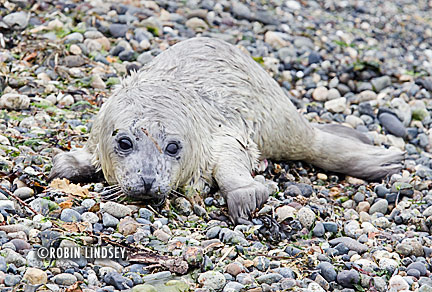
Seal Sitters has also received a report of a live lanugo birth in a South Puget Sound island rookery. Inside the womb, pups have a wavy white coat known as lanugo. For a full-term pup, this long fur is shed before birth. If a pup is born prematurely (with a partial or full lanugo coat), his muscles and lungs will not be fully developed and survival rate is extremely low. The amount of lanugo fur indicates the stage of prematurity.
The photo shown here is of lanugo pup Luigi, born last June on West Seattle’s Alki Beach. A man with a dog was on the beach next to the pup when Seal Sitters first responders arrived. After convincing him he was jeopardizing the survival of the pup, responders cleared the beach and established an extensive tape perimeter, restricting access to the area in hopes that the pup’s mom might return. She was not seen again. A full month premature and weighing only 5.5 kg, she had to be humanely euthanized after 2 days.
At the South Puget Sound rookery on Saturday, WDFW’s marine mammal biologist reports that a boat full of people illegally breached the closed harbor, speeding toward the seal colony where this latest lanugo pup had just been born. The frantic seals were scared from the haulout, leaving the premature pup alone. It is assumed the pup died due to abandonment. Photos of the boat with license number and occupants have been sent to NOAA’s Office for Law Enforcement (OLE) for investigation. If you witness harassment of seals or other marine mammals, a violation of the Marine Mammal Protection Act, please call the OLE Hotline at 1-800-853-1964.
PLEASE, stay back from harbor seal haulouts, where seals gather in numbers - especially during pupping season, now through the end of October in Washington State! It is truly a matter of life and death for seal pups. Observe quietly from a distance. For a map showing pupping timeframes in various parts of the state, click here.
Seal Sitters new volunteer training scheduled for August
Jul/22/14 06:47 AM
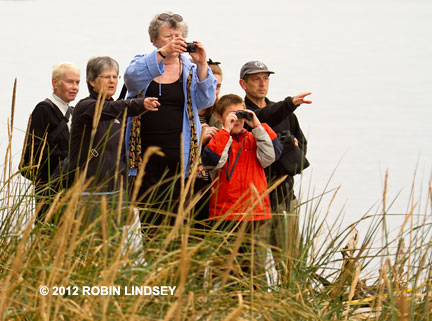
Last year’s record-breaking pupping season stats in West Seattle (from late July’s first response to a newborn seal pup to the end of the year’s weaned pups) included 163 responses to marine mammals, including 66 positively identified seal pups. For a summary of 2013’s activities, click here.
This 2014 season has begun unusually early in West Seattle with responses to one full lanugo seal pup “Luigi”, a second premature pup, and full-term “Junebug” who is now in rehab at PAWS Wildlife Center.
TRAINING DATE:
Saturday morning, August 9, 2014
Time:
10am - 12pm (doors open at 9:30am)
*please note: Plan to arrive early to register and receive paperwork - training begins promptly at 10
Location:
Alki UCC Church 6115 SW Hinds, Seattle (map it)
***A FEW SPOTS OPEN DUE TO LAST MINUTE CANCELLATIONS. Please contact us if you’d like to attend the training.
*Note to parents: All children accompanying adults must be able to sit quietly through an almost two hour presentation (with break).
Seal Sitters MMSN holds several special trainings a year for those wanting to protect marine mammals year-round along the shoreline of West Seattle and the Duwamish River. We are a very active network and have volunteers who travel from around the area to participate. However, if you live out of the West Seattle area and would like to find a stranding network closer to where you live, click here.
Unlike most marine mammal stranding networks, we encourage children to participate in Seal Sitters - supervised at all times, of course, by a parent or guardian. We are so proud of our amazing and dedicated volunteers who are on duty rain or shine - we hope you will join us!
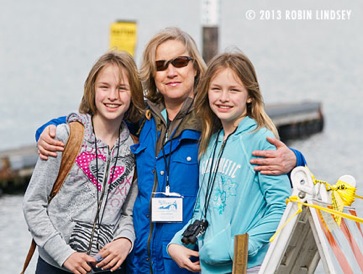
A multi-media presentation will illustrate our educational work in the community and the unique challenges of protecting seals and other marine mammals in an urban environment. Included in the training is an overview of NOAA's West Coast Marine Mammal Stranding Network and biology and behavior of seals and other pinnipeds (due to time frame, supplementary off-season sessions will include more marine mammals of Puget Sound).
For additional questions and info or to be placed on a contact list for future training opportunities, please email us.
Premature pup Ali dies in peace on protected beach
Jun/25/14 06:30 AM
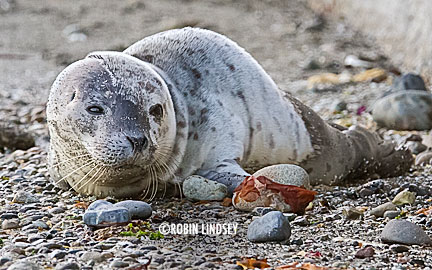
The premature pup originally sighted offshore on Friday, June 20th, worked his way a bit further south along the private stretch of Beach Drive and spent the past several days resting there under the watchful eye of neighbors and Seal Sitters first responders.
The thin pup died last evening. Abandoned by mom (circumstances unknown) and not meeting NOAA’s requirements for rehabilitation (read NOAA policy here), he was given the chance to rest and die in peace in on a quiet beach thanks to caring neighbors. Full-term seal pups have only a 50% chance of surviving their first year and survival rates of premature pups are greatly reduced in the wild. The beautiful little male pup, nicknamed Ali and a true fighter, was examined postmortem - photos of teeth will help our consulting marine mammal biologist estimate age.
Please check back for Seal Sitters' update as we receive more input from the biologist. Heartfelt thanks to everyone who so graciously allowed SS volunteers onto their property to observe and educate neighbors about this sweet little pup. It was a difficult and complicated situation for all involved.
Please contact Seal Sitters' hotline at 206-905-7325 (SEAL) if you have a marine mammal, dead or alive, on your beach.
Full-term harbor seal pups are just now being born in South Puget Sound area rookeries. View WDFW’s seal cam for a chance to see the pup born Monday evening, as well as lanugo pups at a protected harbor seal haulout. You might even get lucky and see a birth! By mid-July full-term pups will outnumber lanugos in the rookeries as seal pupping season will be in full swing in our area.
PUPDATE (June 26, 2014)
After review of photos, WDFW’s marine mammal biologist estimates that premature Ali was about a week old.
Another premature pup in West Seattle
Jun/21/14 07:43 AM
Yesterday morning, Seal Sitter’s first responders followed up on a report of a harbor seal pup in the water “calling” for mom. A homeowner on Beach Drive allowed us through private property to observe the pup just offshore from her home. The pup’s plaintive cry of “maaa-aaa-aa” had been heard since 2:30 am. Consultation with WDFW’s marine mammal biologist confirms that this pup would indeed be premature, as there have not been any recorded full-term births in the South Sound’s harbor seal rookeries - and none are expected till next week.
Since the pup was in the water, we could not assess the coat of the pup to determine how premature he/she might be. The hotline (206-905-7325) received no further reports during the day or evening regarding the pup. If this “preemie” comes ashore, please call our hotline immediately and keep a very low profile - we want to give this pup every chance to survive - and mom’s return is imperative to that goal. If the mom perceives danger from people or dogs, she may not return. If you have seen or heard the pup since yesterday morning, please give our hotline a call with an update as to the pup’s last whereabouts. If the pup is on your beach, please call us so that we may do a telephoto health assessment.
On June 9th, a month-premature lanugo pup nicknamed Luigi was born along Alki Beach. The mom never returned and, sadly, the pup had to be euthanized the following day.
Since the pup was in the water, we could not assess the coat of the pup to determine how premature he/she might be. The hotline (206-905-7325) received no further reports during the day or evening regarding the pup. If this “preemie” comes ashore, please call our hotline immediately and keep a very low profile - we want to give this pup every chance to survive - and mom’s return is imperative to that goal. If the mom perceives danger from people or dogs, she may not return. If you have seen or heard the pup since yesterday morning, please give our hotline a call with an update as to the pup’s last whereabouts. If the pup is on your beach, please call us so that we may do a telephoto health assessment.
On June 9th, a month-premature lanugo pup nicknamed Luigi was born along Alki Beach. The mom never returned and, sadly, the pup had to be euthanized the following day.
Heartbreak as premature seal pup born along Alki Beach
Jun/11/14 06:51 AM
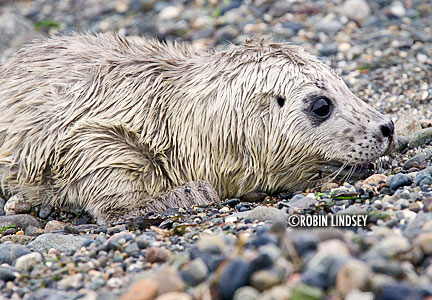
Within minutes, Seal Sitters first responder David and volunteer Eilene were on the scene attempting to establish a protective perimeter with tape and cones, asking people to please stand back. A man with a leashed dog illegally on the beach not only refused to leave the sand, but insisted that it was his right “as a taxpayer” to continue his path past the pup. Apparently, this taxpayer felt it was also his right to break municipal law by having his dog on a Seattle public beach - where dogs are not allowed leashed or unleashed. He finally left after an intense verbal exchange. Another dog owner was nearby throwing a ball into the Sound for his off-leash dog to fetch. We cannot stress enough that dogs are unpredictable and a documented danger to seal pups, causing injury and death to pups in Washington State each year. This was not a good start to our first response of the 2014 seal pupping season.
It was obvious that the surf-soaked pup was a newborn because of the bright flesh-colored umbilicus cord dangling from the pup’s belly. Her body was covered with a long, wavy white lanugo coat (photo above), an indication she was born a month prematurely. A full-term pup will shed this fluffy coat in the womb. We knew this was going to be a difficult situation for both the pup and Seal Sitters, who must try to keep this busy beach area quiet enough that mom might feel safe enough to return for her newborn, who could not survive without her.
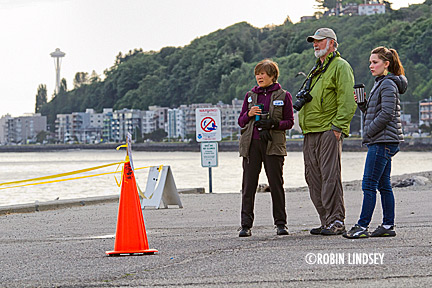
Seal Sitters volunteers tried to keep a low profile at the far ends of the yellow tape boundary, explaining to sympathetic and cooperative onlookers that this pup was believed to have been born that very day. Huge thanks to WDFW marine mammal biologist Dyanna Lambourn for her review of our photos and consultation as to pup’s age and condition.
The pup, nicknamed Luigi, was observed by volunteers throughout the day and discreetly during the dark of night and wee hours of the morning. It was crucial to know if an attending mom would return - no mom ever appeared to our knowledge. During the early morning hours the thin pup moved a bit further up the beach and at first light, the perimeter was adjusted to protect her in what was anticipated to be a warm, and therefore, very crowded day at Alki. Shown in the photo at sunrise with Seattle’s iconic Space Needle in the background are first responder Lynn, science and education advisor Buzz and new volunteer Savanna.
By early afternoon, it became increasingly likely that for unknown reasons, the pup was abandoned with no attending female who would care for this tiny pup. We have no idea what the circumstances surrounding the birth were. Was Luigi born on Alki and mom was scared back into the water by people or dogs before bonding with her pup? Did she give birth just offshore because the beach was busy, but the pup made it to shore alone? Did she die during the birth? If anyone witnessed an adult onshore or very close to shore, perhaps in distress, along Alki Beach Monday afternoon, please contact us. We do know that this pup was too tiny and weak to have swum any substantial distance after birth.
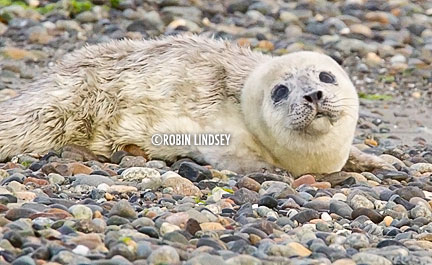
Premature pups - especially one born a month early - rarely survive the lengthy rehab process. If they manage to stabilize for the short term, too often it is only to die shortly after. Nature can be harsh. About 90% of lanugo pups born in the wild don’t survive - and most of those are partial lanugos, not a full month premature. Lanugos require much more maternal care than a full-term pup and some less experienced moms will make the decision to abandon a premature pup whose lungs and muscles may not be fully developed, plus any other factors that may have contributed to an early birth. Even full-term, healthy wild-weaned pups have just a 50% chance of surviving their first year. If a full lanugo pup did manage to make it through rehabilitation and was released, those already daunting odds become even greater against survival in the wild - never having been taught by mom to forage in the expansive waters of Puget Sound. A premature pup’s (for that matter, all pups) best chance is always with mom.
While waiting for authority to transport Luigi for health assessment and as the sun heated up, the pup worked her way down to the water’s edge to thermoregulate and cool down her body temperature. As a crowd of adults and children cried out anxiously, Luigi was swept up in the surf, rolling over and over without the strength to keep from drowning. SS lead investigator Robin donned protective exam gloves (like most animals, seals can transmit disease) and rescued the pup, too weak to swim, from the swirling waves.
Luigi was moved higher up on the sandy beach and we placed an urgent call requesting approval for assessment. That wish was granted and the pup was placed in a kennel and driven to PAWS Wildlife Center in Lynnwood, the only rehab facility in South Puget Sound. Only members of NOAA’s Marine Mammal Stranding Network are authorized to handle and transport marine mammals. It is illegal for the public to touch, feed, move or harass marine mammals.
Sadly, on intake at PAWS, it was determined that sweet Luigi, a female weighing only 5.5 kg (12 lbs, 2 oz) and measuring 70 cm (27.6 in), needed to be humanely euthanized. She was the youngest pup PAWS was known to have received. We thank PAWS for their kindness. We thank, too, our many volunteers who gave Luigi the best chance possible to survive and enabled her to rest quietly on West Seattle’s shore. Luigi gave us all great joy - and educated many people about this special species that is so dear to Seal Sitters MMSN’s heart. On this sad note, we also extend our thanks to the caring public who showed such warmth to our volunteers and to this little seal pup.
Fishing gear - and feeding - a grave danger to seal pups
Oct/26/13 08:22 PM
Yesterday afternoon, we received the necropsy report from WDFW-MMI on seal pup Solo. The very small pup with a traumatic eye injury was rescued from Don Armeni public boat launch Tuesday night, but was euthanized Wednesday at PAWS Wildlife Center. The necropsy revealed that Solo’s right eye had been punctured, possibly from a fish hook, which had caused a significant infection inside the pup’s head. Other potential causes could be a bite from a dog or other seal, but there would have been evidence of other wounds or bruising of tissue around the eye socket - and there was none. It’s estimated the wound was inflicted about 5 days prior.
Since the area around the boat ramp is frequented by fishermen casting from both shore and the fishing piers, this would seem a very probable cause. One morning, much to the distress of one of our volunteers, a fisherman insisted on casting out among seal pups who were foraging close to shore. West Seattle is a daily destination for many fishermen who can be seen all along the shoreline from Jack Block Park to Lincoln Park.
DO NOT FEED SEALS AND SEA LIONS - IT IS AGAINST FEDERAL LAW
Some fishermen will toss bait to seals thinking it will keep them satisfied and less inclined to steal their bait or catch. This is far from the truth. A seal that has been fed will actually seek out humans because it learns to associate humans with easy meals and, consequently, become conditioned to not hunt on his own. Pups learn to be attracted to fishing piers and docks and they will sometimes steal from a fishing line. Needless to say, that does not endear them to fishermen, some of whom may even retaliate. It is dangerous on so many levels. Seals can swallow deadly lures or become entangled in derelict line. At marinas and boat launches, it makes them vulnerable to propeller strikes or being run over by boat trailers. Encouraging pups to hang out in these areas can often have disastrous results - as it apparently did for Solo.
If you’re fishing in an area and a seal is hanging out, take a break and the seal will most likely move on. Please use barbless hooks to reduce the chance of harming them. Make sure all derelict line and gear is removed from beaches and piers. Fish should be cleaned at designated cleaning stations - not on the docks - and scraps should be discarded per regulations. Don’t dump your leftover bait near marina docks or popular fishing spots. You will only be encouraging seals’ unwanted behavior.
Unfortunately, not everyone who purchases bait at local shops does so for fishing purposes. Instead, they feed seals from docks and piers. This can be dangerous not only for seals and sea lions, but for people, too. In Victoria, BC, a young child was pulled into the water by an adult seal as her father cleaned fish on a dock popular for feeding them. Several locations in Victoria irresponsibly promote seal feeding as an attraction. The outer coast of Washington has several marinas where sea lions have become a nuisance because people feed them. Since they have learned to associate people with fish, the sea lions have actually ripped fish from people walking along the dock. An Everett, WA, boat launch has a similar problem with harbor seals. It is only a matter of time before someone is hurt - and, of course, the seals and sea lions will unfairly bear the blame and punishment. DO NOT FEED MARINE MAMMALS. Not only is it illegal (the Marine Mammal Protection Act forbids it) - you are putting both marine mammals and people at risk.
Solo was a very tiny male pup, measuring only 71 cm (90 cm is average length of a newly weaned pup). It is thought that he might have been a lanugo pup, born prematurely. Even if her pup is born early, a seal mom will still only nurse for 4-6 weeks. After that, she needs to replenish her own fat stores.
Since the area around the boat ramp is frequented by fishermen casting from both shore and the fishing piers, this would seem a very probable cause. One morning, much to the distress of one of our volunteers, a fisherman insisted on casting out among seal pups who were foraging close to shore. West Seattle is a daily destination for many fishermen who can be seen all along the shoreline from Jack Block Park to Lincoln Park.
DO NOT FEED SEALS AND SEA LIONS - IT IS AGAINST FEDERAL LAW
Some fishermen will toss bait to seals thinking it will keep them satisfied and less inclined to steal their bait or catch. This is far from the truth. A seal that has been fed will actually seek out humans because it learns to associate humans with easy meals and, consequently, become conditioned to not hunt on his own. Pups learn to be attracted to fishing piers and docks and they will sometimes steal from a fishing line. Needless to say, that does not endear them to fishermen, some of whom may even retaliate. It is dangerous on so many levels. Seals can swallow deadly lures or become entangled in derelict line. At marinas and boat launches, it makes them vulnerable to propeller strikes or being run over by boat trailers. Encouraging pups to hang out in these areas can often have disastrous results - as it apparently did for Solo.
If you’re fishing in an area and a seal is hanging out, take a break and the seal will most likely move on. Please use barbless hooks to reduce the chance of harming them. Make sure all derelict line and gear is removed from beaches and piers. Fish should be cleaned at designated cleaning stations - not on the docks - and scraps should be discarded per regulations. Don’t dump your leftover bait near marina docks or popular fishing spots. You will only be encouraging seals’ unwanted behavior.
Unfortunately, not everyone who purchases bait at local shops does so for fishing purposes. Instead, they feed seals from docks and piers. This can be dangerous not only for seals and sea lions, but for people, too. In Victoria, BC, a young child was pulled into the water by an adult seal as her father cleaned fish on a dock popular for feeding them. Several locations in Victoria irresponsibly promote seal feeding as an attraction. The outer coast of Washington has several marinas where sea lions have become a nuisance because people feed them. Since they have learned to associate people with fish, the sea lions have actually ripped fish from people walking along the dock. An Everett, WA, boat launch has a similar problem with harbor seals. It is only a matter of time before someone is hurt - and, of course, the seals and sea lions will unfairly bear the blame and punishment. DO NOT FEED MARINE MAMMALS. Not only is it illegal (the Marine Mammal Protection Act forbids it) - you are putting both marine mammals and people at risk.
Solo was a very tiny male pup, measuring only 71 cm (90 cm is average length of a newly weaned pup). It is thought that he might have been a lanugo pup, born prematurely. Even if her pup is born early, a seal mom will still only nurse for 4-6 weeks. After that, she needs to replenish her own fat stores.
Don't touch seal pups! Rash of illegal pickups endanger pups
Jul/14/13 07:12 AM
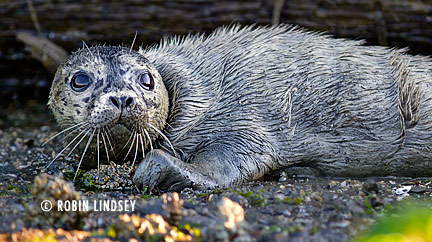
It is against Federal law, the Marine Mammal Protection Act, to touch, feed or move a seal pup. Violations are subject to stiff fines and can include jail time, depending on the severity of the crime.
One of the most common wrong assumptions that people make is thinking that a pup needs to be in the water, not on shore. Pups haul out to rest and warm up from our very frigid Northwest waters. Never return a pup to the water. They need to rest - on beaches, log booms, docks - even, occasionally, passing kayaks and paddle boards. Never cover a pup with a blanket - they can overheat and suffer brain damage.
During pupping season (June - September in South Puget Sound), it’s not unusual for a pup to suckle rocks or logs when mom isn’t around. The newborn pup shown here, with a long, white lanugo coat usually shed in the womb, was suckling on rocks and calling for mom, who returned to tend to her offspring. A newborn will still have a bit of the umbilicus cord protruding. It is not an “injury” as many people think and usually falls off after a week or so. If you see a pup you are concerned about, call the stranding network - don’t touch or try to feed the pup.
Share the shore. If you see a seal pup, stay back - 100 yards whenever possible. The best chance a pup has for survival is to stay in the wild, undisturbed by humans. If a pup is under 4-6 weeks old and is alone on the beach, almost always mom is nearby. If she sees people or dogs (a significant danger) too close, she may well abandon the pup who cannot survive without her. A pup taken to rehab does not have nearly the chance to make it back in the wild as a pup who remains there with mom, learning how to forage and gaining immunity from disease while nursing on her rich milk. Even then, pups have a 50% mortality rate their first year.
Never take a pup from the beach. Only members of NOAA’s Marine Mammal Stranding Network or NOAA authorized personnel can transport a marine mammal. A pup taken illegally from the beach to a wildlife facility, by law cannot be treated until approved by NOAA. While you may think you are saving a pup, instead you are gravely endangering him. Being removed from the beach, handled and put into a car can cause life threatening stress. Please don’t disturb resting seal pups. If you are concerned about the health of an animal or if there is harassment by people or dogs, call the NOAA hotline @ 800- 853-1964 or the Seal Sitters hotline @ 206-905-7325 (SEAL) and we will direct you to the proper standing network for response.
Be on the alert for newborn: pupping season has begun in area
Jun/11/13 09:48 PM
It is official: harbor seal pupping season is now underway in the inside waters of South Puget Sound. A lanugo pup was reported in the Gig Harbor area, but sadly had to be euthanized today. The long, wavy white lanugo coat is usually shed in the womb and indicates a premature birth. It is not known whether the presence of so many people around this pup caused abandonment by the mom or if there was another cause. Please remember to STAY AWAY from any pup resting on shore, keep dogs leashed at all times on or near the beach and call the stranding network for the area. Click the links for a map of stranding networks in the Pacific Northwest: Washington map | Oregon map
Yesterday afternoon Seal Sitters responded to a report from a kayaker of a woman harassing a seal at Constellation Park. He warned the woman, who was trying to force the seal back into the water, to stop and get back. Our responder was on the scene within minutes, finding an adult seal alone at the water’s edge. It was obvious that the seal had serious health issues. Shortly after consulting by phone with WA Department of Fish and Wildlife’s marine mammal biologist, the female seal died. Volunteers carried the 125 lb body across the long stretch of beach up into the woody debris. Since the biologist would not be able to pick the animal up for necropsy until this morning, the seal was packed in ice and volunteers built a small shelter of wood to keep the blistering sun at bay.
The seal was picked up this morning and taken for necropsy by WDFW. This evening we received the sad news from biologist Dyanna Lambourn that the small female, estimated to be around 4-6 years old, was postpartum, having given birth about two days ago. The cause of death was undetermined, however, she had an infected uterus. Sterile brain tissue samples were sent to Washington DC for tests.
It is conceivable the female gave birth somewhere in West Seattle or nearby. We are asking all waterfront property owners and those who walk along the beach to please be on the alert for a newborn pup. A pup can live for about a week and a half without nourishment from the mother. Call Seal Sitters hotline @ 206-905-7325 (SEAL) immediately if you see any marine mammal, dead or alive, on shore.
We still have a number of last year’s pups, now close to a year old and called yearlings, using Lincoln Park and the Alki platforms (including one very chubby one at Constellation Park on Sunday), so a pup you see may not necessarily be a newborn or recently weaned pup from this 2013 season. Please, however, call us asap regarding any pups you see on the beach, staying well back to avoid stressing out the animal or scaring him back into the water.
NOTE: We heard reports (unfortunately too late) of a mom and pup at Lincoln Park on Sunday. If you were one of the many folks who were taking photos, please email us so we can verify if it was truly a mother with a newborn pup and, if so, to identify them.
Yesterday afternoon Seal Sitters responded to a report from a kayaker of a woman harassing a seal at Constellation Park. He warned the woman, who was trying to force the seal back into the water, to stop and get back. Our responder was on the scene within minutes, finding an adult seal alone at the water’s edge. It was obvious that the seal had serious health issues. Shortly after consulting by phone with WA Department of Fish and Wildlife’s marine mammal biologist, the female seal died. Volunteers carried the 125 lb body across the long stretch of beach up into the woody debris. Since the biologist would not be able to pick the animal up for necropsy until this morning, the seal was packed in ice and volunteers built a small shelter of wood to keep the blistering sun at bay.
The seal was picked up this morning and taken for necropsy by WDFW. This evening we received the sad news from biologist Dyanna Lambourn that the small female, estimated to be around 4-6 years old, was postpartum, having given birth about two days ago. The cause of death was undetermined, however, she had an infected uterus. Sterile brain tissue samples were sent to Washington DC for tests.
It is conceivable the female gave birth somewhere in West Seattle or nearby. We are asking all waterfront property owners and those who walk along the beach to please be on the alert for a newborn pup. A pup can live for about a week and a half without nourishment from the mother. Call Seal Sitters hotline @ 206-905-7325 (SEAL) immediately if you see any marine mammal, dead or alive, on shore.
We still have a number of last year’s pups, now close to a year old and called yearlings, using Lincoln Park and the Alki platforms (including one very chubby one at Constellation Park on Sunday), so a pup you see may not necessarily be a newborn or recently weaned pup from this 2013 season. Please, however, call us asap regarding any pups you see on the beach, staying well back to avoid stressing out the animal or scaring him back into the water.
NOTE: We heard reports (unfortunately too late) of a mom and pup at Lincoln Park on Sunday. If you were one of the many folks who were taking photos, please email us so we can verify if it was truly a mother with a newborn pup and, if so, to identify them.
ALERT: Seal pupping season underway on the outer coast
May/26/13 01:50 PM
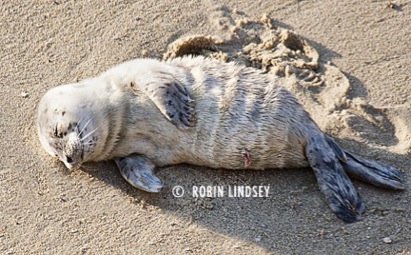
It is normal for a seal pup to be alone on the beach. Occasionally a mother harbor seal will leave her pup to rest while she forages for food, returning to nurse him. If there are people and dogs too close, she may abandon the pup. Most times, however, the pup will accompany mom to learn how to forage. Once pups are weaned at 4-6 weeks, they will be all on their own, using shoreline daily to rest and warm up before returning to the water. Seals of all ages rest on shore about 50% of their day. Undisturbed, stress-free rest is crucial to their survival.
Seal pupping season begins in South Puget Sound in late-June, extending into September. As pups are weaned in our area rookeries, they venture off to surrounding areas. West Seattle’s busiest months for newly weaned seal pups are September and October. For a map showing pupping seasons in the various regions of Washington state, click here.
Click the links for a map of stranding networks in the Pacific Northwest: Washington map | Oregon map
Seal pup births in South Puget Sound - season officially underway
Jun/28/12 06:00 PM
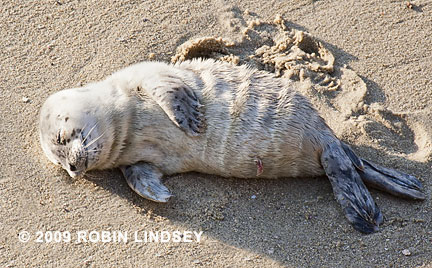
There was also a report of a partial lanugo pup on the beach in Edmonds. A lanugo coat, long and fluffy white fur, is usually shed in the womb of the mother seal. Sometimes, though, when a pup is born a bit prematurely, the coat will still be on the newborn. This coat is quickly shed and replaced by a new coat. Sadly, a lanugo pup has less chance of survival than a full-term pup. A pup’s best chance is with an attentive mom, nursing on her rich (50% fat) milk. If you come upon a seal pup, please stay back and notify the stranding network. Most likely mom is around, but volunteers will monitor the pup and keep him safe from people and dogs.
Make sure you check the blog frequently for “pupdates”. News on the beach should start picking up soon, after a welcome break from our very busy off-season with many weaned pups sticking around West Seattle. Seal Sitters will be assimilating new volunteers during the season by offering a few smaller scale training sessions, on the beach and in meet-ups. If you are interested in volunteering, please email us.
Pupdate: where the heck are they?
Jul/31/10 08:57 AM
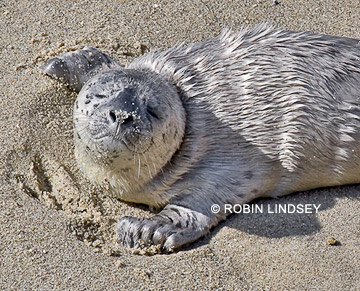
Since both pups and adult seals follow the food source it is hard to say when they might arrive. They could fool us and be a little early this year based on so much activity in the south end. So, keep your binoculars handy when you’re out walking the beaches. And don’t forget to give Seal Sitters’ dispatch a call if you spot a pup.
Pupping season has begun - don't touch seal pups!
Jul/03/10 08:28 PM
